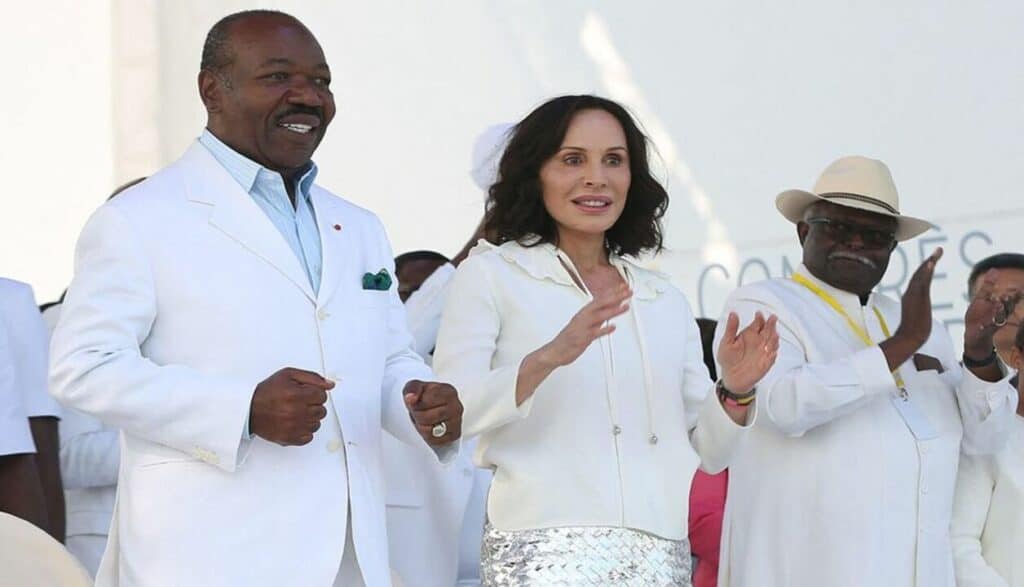– Victor Assis
On August 30th, a group of uniformed men announced the end of Ali Bongo’s regime in Gabon. “We have decided to put an end to the current regime. Therefore, the general elections of August 26, 2023, along with their manipulated results, are canceled. Borders are closed until further notice. All institutions of the Republic are dissolved,” announced Colonel Ulrich Manfoumbi Manfoumbi.
By the end of the day, analyses of what had just happened in the Central African country had already formed some consensus. That the military coup had been successful, there was no doubt: there was no reaction to the military takeover. The president and other top members of the deposed government were arrested. It was also widely agreed that the deposed government was very unpopular, and the elections had been very turbulent, which favored the military in overthrowing the regime.
Despite these consensuses, over time, various theories about the nature of the coup against Ali Bongo and the intentions of the military junta began to emerge. This confusion did not arise by chance, nor is it solely due to the scarcity of available information: major French, American, and British newspapers sought to encourage misguided analyses of the situation in Gabon to minimize their reputation damage with African countries.
From now on, we will delve into these theories to clearly establish what is happening in Gabon.
Was the coup orchestrated by France?
It may sound like a joke, but one of the main “explanations” that emerged for the military coup in Gabon was that France was concerned about the situation on the continent following the coup in Niger. Therefore, it allegedly organized a kind of “self-coup” to reorganize the Gabonese regime and prevent its collapse. “It’s a coup d’état to save Françafrique,” said YouTuber Nathalie Yamb in the video “Coup in Gabon: Who is Brice Oligui Nguema working for?” This theory is baseless and is a frivolous accusation that the military was working for the French. The only argument in favor of this theory is that the military did not immediately take any aggressive measures against France, such as banning the French language. This seemingly moderate aspect of the military junta will be discussed later in this article.
Before delving into that aspect, let’s consider everything that weighs against the theory of a “self-coup.” Firstly, trying to prevent a coup with another coup at a time when there is a wave of coups is a strange policy, to say the least. Throughout the world, Gabon was quickly associated with Niger, just as Niger was quickly associated with Burkina Faso. The coup in Gabon only added fuel to the fire that has become Africa, providing further stimulus to the military forces that are currently considering overthrowing their own governments. The issue is simple: since the coup targeted a president closely connected to France, rather than a president in conflict with France, the lesson to be drawn is that presidents linked to the French government are vulnerable, and any country’s military can overthrow them.
Therefore, to control the situation in a tiny country, France would have committed the madness of encouraging a wave of coups on the continent. France, which was already perceived as weak, would have gone to great lengths to appear even more fragile. This would be a suicidal policy!
Secondly, the continental impact of the coup in Gabon far exceeded the excitement on social media. Two days after the coup, Cameroon, Rwanda, and Uganda had already carried out purges in their armed forces, indicating clearly that the actions of the Gabonese military had infected the military forces of other countries in the region. A few days later, Guinea-Bissau announced significant changes in the presidential guard.
A third important point is that France terminated its military cooperation agreement with the Gabonese state. The justification was not the “breakdown of democracy” but rather the fact that the French government did not trust the Gabonese CTRI (Intervention and Reaction Forces Command)! In other words, the French government had no control over the military junta that had taken power. “Regarding the military presence, these are soldiers who receive training and have always been alongside the Gabonese army. Currently, their activities are suspended while awaiting clarification of the political situation,” said Minister Sébastien Lecornu.
Was the coup orchestrated by the United States?
Another widely circulated “theory” was that the United States was behind the coup. In this case, there are two arguments in favor of its proponents: that General Brice Oligui Nguema, leader of the military junta, owned properties in the United States and that the Americans, in view of the French regime’s weakness, acted to grab one of its semicolonies.
Regarding the first argument, it doesn’t mean anything. It’s just a handful of speculations that do not allow any conclusion. For example, the Ghana Web portal presents the most common accusation, that Nguema was part of a corruption scheme: “He has been part of the president’s entourage for four years. Two years ago, he bought three properties in the United States for one million dollars in cash. When questioned by an investigative panel, he responded that it was a private matter and refused to answer any further questions.” Let’s assume all of this is true: during his time in government, Nguema may have engaged in some illicit business in the United States. But what would lead to the conclusion that the United States had “bought” the general?
The so-called investigations cited by Ghana Web did not only target Nguema but also Ali Bongo himself! Supporters of the theory that Nguema was “in the pocket” of the United States would have to explain why Ali Bongo also benefited, as the goal was precisely to overthrow him. Would Ali Bongo, then, be part of the coup against himself?
Clearly, even if the property case were real, it says nothing about the nature of the military coup in Gabon. It only confirms what everyone already knew: that Nguema was part of Ali Bongo’s government.
As for the idea that the United States would be interested in “grabbing” the French semicolonies, that argument also does not hold water. Not due to ethical reasons: the United States, accused of blowing up the Nordstream pipeline, severely damaging its European allies, especially Germany, could indeed “steal” the semicolonies from its ally France. However, the problem is political: the United States also has no interest in adding fuel to the fire.
The wave of coups in Africa has been highly unfavorable to U.S. foreign policy. Countries like Niger and Burkina Faso are openly strengthening ties with Russia, a country that is at war with the United States by proxy. What interest would the Americans have in making this wave grow, particularly one that could impact a country like Nigeria, which currently plays a central role in policing neighboring countries?
Is Nguema another “Bongo”?
The theories alleging that France or the United States orchestrated the coup, in addition to being very weak, primarily attack the figure of Brice Oligui Nguema. Fundamentally, that is what it comes down to: ultimately, they are an attempt to sow discord among those who celebrated the overthrow of Gabon’s new leader.
The idea that he would be “part of the system” because he allegedly got involved in corruption schemes is also pure intrigue. Was Vladimir Putin, who was Prime Minister under Boris Yeltsin, not “part of the system”? He is now the man who is most openly challenging the United States militarily. Wasn’t the Taliban, funded by the United States, “part of the system”? Yet, they managed to score one of the most significant victories against imperialism in recent years.
Critics of Nguema say that he is a cousin of Ali Bongo, which apparently has some basis. However, that is not significant: in 2020, three members of the Saudi royal family were arrested for attempting a coup, revealing that there is indeed contradiction among members of the same family.
What is most interesting about the intrigue that Nguema is a “Bongo” is that it comes from… the BBC! The news organization controlled by the intelligence systems of Great Britain. In this case, it is clear where the interest in attacking the image of the transitional president comes from. “‘General Brice Oligui Nguema is a direct product of the Bongo clan,’ said the source, who wished to remain anonymous for security reasons,” says a BBC article. “The reality is that the coup is largely a continuation of the same system, only with a different name,” another “source” supposedly said.
Things need to be looked at concretely. Did the new government, in the next ten days, act as if it were a continuation of the Bongo dynasty? No, quite the opposite. The military junta exposed the corruption systems of all top government members, released political prisoners, restored student scholarships, and pledged to fund the country’s development. This policy shows a willingness to break with the previous regime.
There are also two very important signs of a break from the previous order. The first is that the transitional government decided to appoint a staunch opponent of Ali Bongo as prime minister. The second, even more important, is that the transitional president “retired” the president of the Constitutional Court, who was the backbone of the regime. The court endorsed elections and decisions made by Ali Bongo’s government. The court’s president was also Omar Bongo’s lover, the father of the deposed president.
Does Nguema need to hand over power to civilians now?
Another intrigue that seeks to throw cold water on those who celebrated the overthrow of the Ali Bongo regime is that the military should not govern but should transfer control of the state to the supposed election winner, Albert Ondo Ossa. According to the BBC, he himself called it a “palace coup” and demanded that the presidency be handed over to him. However, after meeting with Brice Oligui Nguema, he himself withdrew his criticisms.
The fact is that to overthrow Ali Bongo’s regime once and for all, it is not possible to simply pass the presidential baton to someone else. The regime has been deeply entrenched in the country for 56 years. A civilian like Albert Ondo Ossa would not have the ability to dismantle the entire regime, especially considering that there are no strong political parties in Gabon.
The country needs a thorough clean-up. It needs to restructure the courts, the legislative assemblies, and the federal constitution. Therefore, the decision to organize the transition through a military junta is understandable.
According to the prime minister, the military’s plan is to remain in power for only two years.







